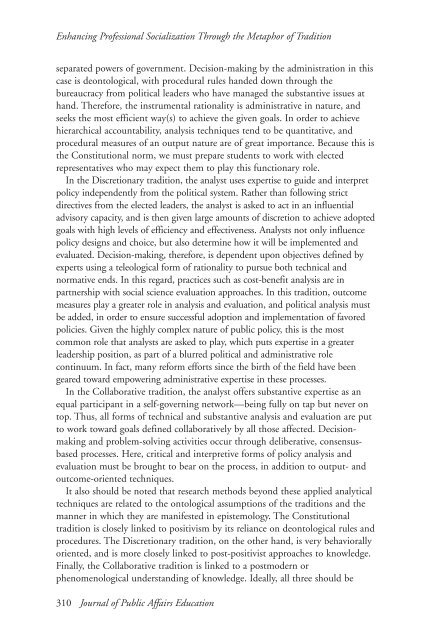JOURNAL OF PUBLIC AFFAIRS EDUCATION - naspaa
JOURNAL OF PUBLIC AFFAIRS EDUCATION - naspaa
JOURNAL OF PUBLIC AFFAIRS EDUCATION - naspaa
You also want an ePaper? Increase the reach of your titles
YUMPU automatically turns print PDFs into web optimized ePapers that Google loves.
Enhancing Professional Socialization Through the Metaphor of Tradition<br />
separated powers of government. Decision-making by the administration in this<br />
case is deontological, with procedural rules handed down through the<br />
bureaucracy from political leaders who have managed the substantive issues at<br />
hand. Therefore, the instrumental rationality is administrative in nature, and<br />
seeks the most efficient way(s) to achieve the given goals. In order to achieve<br />
hierarchical accountability, analysis techniques tend to be quantitative, and<br />
procedural measures of an output nature are of great importance. Because this is<br />
the Constitutional norm, we must prepare students to work with elected<br />
representatives who may expect them to play this functionary role.<br />
In the Discretionary tradition, the analyst uses expertise to guide and interpret<br />
policy independently from the political system. Rather than following strict<br />
directives from the elected leaders, the analyst is asked to act in an influential<br />
advisory capacity, and is then given large amounts of discretion to achieve adopted<br />
goals with high levels of efficiency and effectiveness. Analysts not only influence<br />
policy designs and choice, but also determine how it will be implemented and<br />
evaluated. Decision-making, therefore, is dependent upon objectives defined by<br />
experts using a teleological form of rationality to pursue both technical and<br />
normative ends. In this regard, practices such as cost-benefit analysis are in<br />
partnership with social science evaluation approaches. In this tradition, outcome<br />
measures play a greater role in analysis and evaluation, and political analysis must<br />
be added, in order to ensure successful adoption and implementation of favored<br />
policies. Given the highly complex nature of public policy, this is the most<br />
common role that analysts are asked to play, which puts expertise in a greater<br />
leadership position, as part of a blurred political and administrative role<br />
continuum. In fact, many reform efforts since the birth of the field have been<br />
geared toward empowering administrative expertise in these processes.<br />
In the Collaborative tradition, the analyst offers substantive expertise as an<br />
equal participant in a self-governing network—being fully on tap but never on<br />
top. Thus, all forms of technical and substantive analysis and evaluation are put<br />
to work toward goals defined collaboratively by all those affected. Decisionmaking<br />
and problem-solving activities occur through deliberative, consensusbased<br />
processes. Here, critical and interpretive forms of policy analysis and<br />
evaluation must be brought to bear on the process, in addition to output- and<br />
outcome-oriented techniques.<br />
It also should be noted that research methods beyond these applied analytical<br />
techniques are related to the ontological assumptions of the traditions and the<br />
manner in which they are manifested in epistemology. The Constitutional<br />
tradition is closely linked to positivism by its reliance on deontological rules and<br />
procedures. The Discretionary tradition, on the other hand, is very behaviorally<br />
oriented, and is more closely linked to post-positivist approaches to knowledge.<br />
Finally, the Collaborative tradition is linked to a postmodern or<br />
phenomenological understanding of knowledge. Ideally, all three should be<br />
310 Journal of Public Affairs Education
















